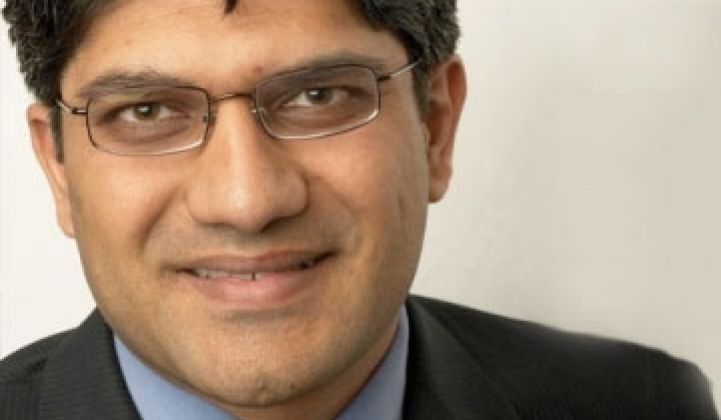Jigar Shah, CEO of the Carbon War Room and Founder of Sun Edison, spoke at Camstar's Summit on Solar Quality event today in Santa Clara, California. I managed to chat with him before he delivered his keynote.
He was adamant. "The solar industry controls its own destiny." The industry thinks it's "controlled by subsidies or the price of silicon," but in his view, it's held back more by timidity than by those external factors. Shah went on to claim, "We are going to be at 100,000 megawatts -- and we need to act that way."
In Shah's view, countries like Nigeria, Uganda, Kenya and South Africa (with support from the World Bank, OPEC, ADB and Export Import Banks) are ready to install massive amounts of solar, but are held back by the lack of expertise in those nations.
Shah's keynote covered how quality affects purchasing decisions and pricing in the solar industry. Here are some tidbits from his talk:
- "It's a foregone conclusion that everyone is going to try a DC-to-DC solution." Shah said that we could see this in as soon as 18 months. This should come as great news to firms like Solar Edge, Tigo Energy, eIQ and National Semiconductor that seek to integrate their distributed MPPT chip sets in the solar panels. Shah cited improved power production, monitoring capabilities and the ability to swap panels from different vendors as the obvious value for this solution.
- "The customer is the bank."
- Panels on trackers are not actual Tier 1 solutions. Trackers don't work in Germany, though Arizona might be a little better. Soon people will be maximizing profit per square foot rather than watts per square foot. Dan Shugar at Solaria might disagree with this point.
- It's the industry's job to characterize how well the industry is doing. "I don't know what the Moore's Law is for the solar industry but its not efficiency." He suggested that it was "Photon or Pennwell or Greentech Media's job" to determine that metric. He also said that there might be a set of six or seven metrics including LCOE and dollars per watt.
- There are global supply chain shortages because the industry doesn't plan more than two or three quarters in advance.
- "We can't continue with double-digit growth rates by doing what we do now." He urged manufacturers to adopt even more automation. "The big companies like Flextronics and Jabil join us because they think we will have double-digit growth over the next two decades."
- "We need an automotive-type process to get to these volumes and growth."
- The growth of the industry is directly proportional to how much project money comes into the industry.
- "My guess is we could get to 20 percent solar penetration before we need chemical storage. In the U.S., we haven't come close to the levels of penetration necessary for storage to matter. Demand response and thermal storage will get the U.S. through the end of the decade."
- Bankability means that the company has to have been in the market for more than five years.
Shah also said, "The technology will never be the bottleneck. The bottleneck is implementation and the ability to attract capital."



